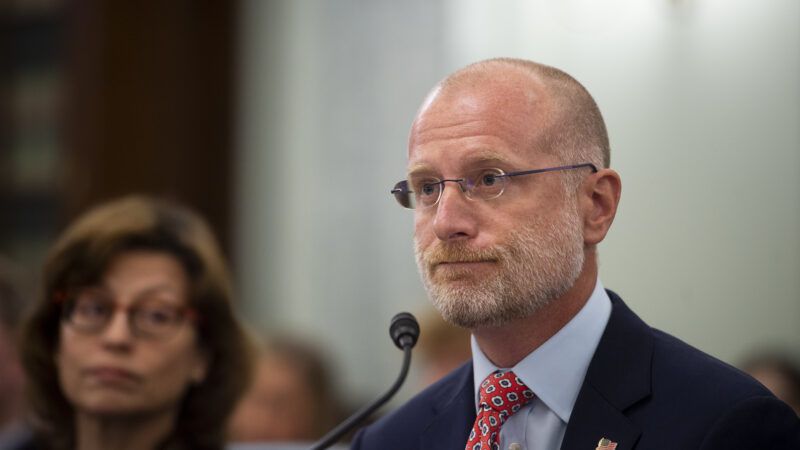Brendan Carr Says Networks Must Serve the 'Public Interest.' What Does That Mean?
Congress placed the term in the law but chose not to define it, leaving that task for future regulators.

On his ABC late-night show last Monday, Jimmy Kimmel criticized President Donald Trump and his followers for their actions since Charlie Kirk's murder. Within days, Kimmel's show was suspended, after Federal Communications Commission (FCC) Chairman Brendan Carr publicly threatened reprisal. (Kimmel's show is set to return to the air Tuesday.)
The entire affair was blatantly improper, as a federal official leaned on a private company to censor an employee's protected speech. Carr, meanwhile, says he's just pursuing the "public interest." What does that actually mean? Just about anything a regulator wants, it turns out.
Unlike other forms of media, radio and network TV stations broadcast over public airwaves, which the FCC polices by issuing broadcast licenses. Federal law authorizes the FCC to ensure licensees serve "the public interest, convenience, and necessity."
"Generally, this means [a broadcaster] must air programming that is responsive to the needs and problems of its local community of license," the FCC claims.
Carr often cites the "public interest" as his goal for FCC actions. "Broadcast media have had the privilege of using a scarce and valuable public resource—our airwaves. In turn, they are required by law to operate in the public interest," he wrote in November 2024, the day after Trump announced he would appoint Carr to head the agency. "When the transition is complete, the FCC will enforce this public interest obligation."
In his current role, Carr has evoked the "public interest" to justify numerous FCC actions—including investigations of Comcast's relationship with NBC affiliates and a San Francisco radio station's coverage of immigration enforcement in San Jose, and accusing NBC of "news distortion" for its coverage of an immigration case.
"One thing that we're trying to do is to empower those local stations to serve their own communities," Carr told conservative podcaster Benny Johnson last week. "And the public interest means you can't be running a narrow partisan circus and still meeting your public interest obligations."
Who's to say if Carr's actions are in those local communities' best interest? Law and judicial precedent actually give him some pretty considerable leeway.
"Perhaps no single area of communications policy has generated as much scholarly discourse, judicial analysis, and political debate over the course of the last seventy years as has that simple directive to regulate in the 'public interest,'" Erwin G. Krasnow and Jack N. Goodman wrote in a 1998 article for the Federal Communications Law Journal, a publication of Indiana University's Maurer School of Law. "If the history of this elusive regulatory standard makes anything clear, it is the fact that just what constitutes service in the 'public interest' has encompassed different things at different times."
Congress first included the phrase "public interest, convenience, and necessity" in the Radio Act of 1927, but did not define it—leaving it for future regulators to interpret. "Our opinions have repeatedly emphasized that the [FCC]'s judgment regarding how the public interest is best served is entitled to substantial judicial deference," the U.S. Supreme Court wrote in 1981's FCC v. WNCN Listeners Guild. Subsequent legislation expanded the government's regulatory power but largely kept the "public interest" standard intact.
"Few independent regulatory commissions have had to operate under such a broad grant of power with so few substantive guidelines," Krasnow and Goodman wrote.
One would imagine the "public interest" is best served by respecting the First Amendment and defending free speech. "The FCC has long held that 'the public interest is best served by permitting free expression of views,'" according to the agency's website. "Rather than suppress speech, communications law and policy seeks to encourage responsive 'counter-speech' from others. Following this principle ensures that the most diverse and opposing opinions will be expressed, even though some views or expressions may be highly offensive."
But that would directly contradict Carr's actions: Over the past week, Carr not only pressured a broadcaster to punish one of its hosts over intemperate comments, he gloated over the host's suspension and pledged daytime chat show The View might be next in his crosshairs.
The "public interest standard" is in fact "not really a standard because it doesn't tell you what they can't do," Thomas W. Hazlett, an economics professor at Clemson University, tells Reason. "There is some formal structure to the process, but in terms of an actual regulatory standard, it basically means that we're going to make rules according to what we think is right. And of course, if you want to do things that are different and exercise power in a certain direction, you'll talk a lot about public interest because it's a very wide berth for justifying what you're trying to do. It does dress it up a little bit, that it's not just politics, it's bigger than that, but not really: It's what the five members of the commission vote to do, and that's the beginning and the end."
As Reason's Robby Soave noted, one person who understood this was Ayn Rand, who wrote in 1962 that a government-enforced public interest standard was simply a more sophisticated form of censorship, "for stifling the freedom of men's minds."


Show Comments (83)